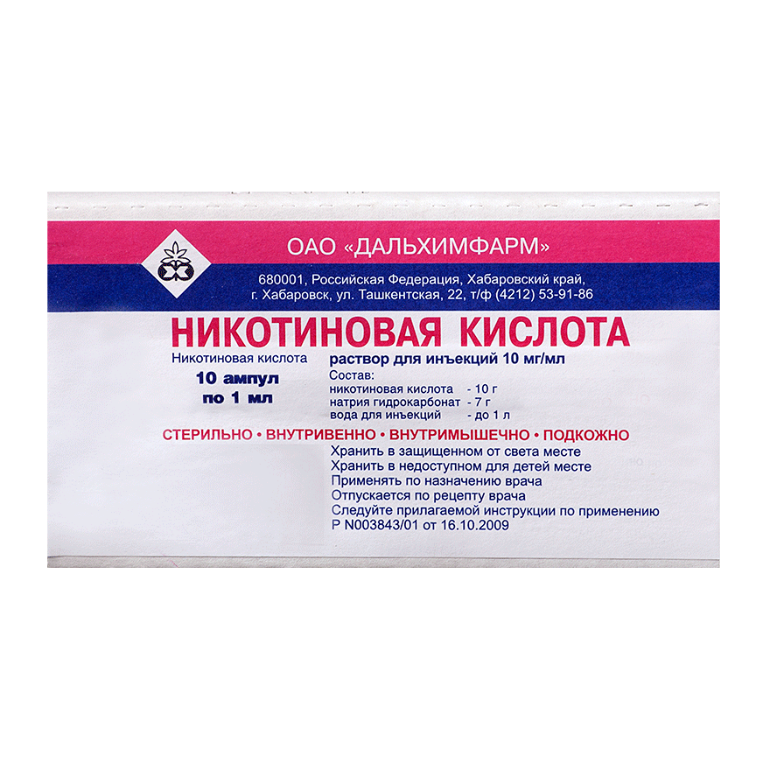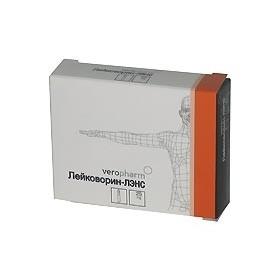Description
Latin name
NICOTINIC ACID
Release form
Injection.
packaging 10 pcs
Pharmacological action
NICOTIC ACID – supplementing deficiency of vitamin PP (B3), vasodilating, hypolipidemic, hypocholesterolemic. It is included in a prosthetic group of enzymes that are carriers of hydrogen: nicotinamide adenine dinucleotide (NAD) and nicotinamide adenine dinucleotide phosphate (NADP), it regulates redox processes, tissue respiration, protein and fat synthesis, and glycogen breakdown. Inhibits lipolysis in adipose tissue, reduces the rate of synthesis of VLDL. It normalizes the lipid composition of the blood: reduces the level of total cholesterol, LDL, triglycerides and increases the level of HDL, has antiatherogenic properties. It has a vasodilating effect, including on the vessels of the brain, improves microcirculation, increases the fibrinolytic activity of the blood and reduces platelet aggregation (reduces the formation of thromboxane A2). It has detoxification properties. It is effective in Hartnup disease – a hereditarily caused violation of tryptophan metabolism, accompanied by a deficiency in the synthesis of nicotinic acid. It is well absorbed in the pyloric stomach and upper duodenum. It partially biotransforms in the liver with the formation of N-methylnicotinamide, methylpyridonecarboxamides, glucuronide and a complex with glycine. It is excreted in the urine.
Indications
Prevention and treatment of pellagra (vitamin deficiency PP) atherosclerosis, hyperlipidemia, peripheral vascular spasm, including obliterating endarteritis, Raynaud’s disease, migraine, cerebrovascular accident, including ischemic stroke (complex therapy), angina pectoris, Hartnup disease, hypercoagulation, facial nerve neuritis, intoxication, long-term non-healing wounds, ulcers, infectious diseases, gastrointestinal diseases.
Contraindications
Hypersensitivity, peptic ulcer of the stomach and duodenum (in the acute stage), severe impaired liver function, gout, hyperuricemia, severe forms of arterial hypertension and atherosclerosis (iv). Restrictions on the use of: pregnancy, lactation.
Use during pregnancy and lactation
Caution is advised during pregnancy and lactation (high doses are contraindicated).
Composition
Active ingredient: 10 mg nicotinic acid
excipients: sodium bicarbonate – up to pH 57 water for injection – up to 1 ml
Dosage and administration of
I / O slowly, i / m, s / c. With pellagra: adults – intramuscularly at 0.1 g, 1-2 times a day for 10-15 days. In case of ischemic stroke: i.v., 0.01-0.05 g.
Side effects
Due to histamine release: redness of the skin, including face and upper half of the body with a sensation of tingling and burning sensation, a rush of blood to the head, dizziness, hypotension, orthostatic hypotension (with rapid on / in the introduction), increased secretion of gastric juice, itching, dyspepsia, urticaria. With prolonged use of large doses: diarrhea, anorexia, vomiting, impaired liver function, fatty liver, ulceration of the gastric mucosa, arrhythmia, paresthesia, hyperuricemia, decreased glucose tolerance, hyperglycemia, transient increase in AST, LDH, alkaline phosphatase activity, mucosal irritation gastrointestinal membrane.
Drug interaction
Potentiates the action of fibrinolytic agents, antispasmodics and cardiac glycosides, the toxic effect of alcohol on the liver. Reduces the absorption of bile acid sequestrants (an interval of 1.5 2 hours between doses is necessary) and the hypoglycemic effect of antidiabetic drugs. Possible interaction with antihypertensive drugs, acetylsalicylic acid, anticoagulants.
Storage Conditions
In a dry, dark place at room temperature.
Expiration
5 years.
active substance
Niacin
conditions granted through pharmacies
In retseptu
Dosage form
solution for injection
Indications
From vascular damage in diabetes mellitus, From hypovitaminosis, In diabetic nephropathy, From cerebrovascular accident, From wounds, From pain situ Reynaud, gastritis, from neuritis
Possible product names
Nicotinic acid ampoules 1%, 1 ml, 10 pcs.
Dalkhimpharm, Russia


